This past weekend, I came face-to-face with a reality that most Americans never see. As I stood in the modest station of a three-person police department in rural Nebraska, the harsh realities of small-town law enforcement hit me. While our nation debates police reform in big cities, we're overlooking a silent crisis unfolding in the heartland of America. The vulnerability I witnessed stems from a critical shortage of three essential elements: training, equipment, and staff.
In these small towns, police departments are running on fumes. The officers I met are doing their best, but how can three possibly provide 24/7 coverage? The math doesn't add up. Yes, county deputies might be available to assist in times of need, but what happens when they're tied up with their own calls? The result is a dangerous game of chance, where the safety of entire communities hangs in the balance.
The dread I felt deepened as I thought more about their situation. The response might consist of a single officer if disaster strikes - be it a mass casualty incident or an active shooter situation. One individual, possibly outgunned and outnumbered, would be the only thing standing between citizens and catastrophe. If a life flight was needed, there might not be one available. The nearest trauma center? Likely 30 minutes or more away - an eternity when every second counts.
What struck me was the realization that this crisis remains largely invisible to most Americans. No cameras are rolling in these backcountry towns, and no reporters are standing by to broadcast every incident. The media's gaze rarely turns to these quiet corners of our nation, leaving their struggles unnoticed and their stories untold. This lack of attention perpetuates a dangerous cycle of neglect, allowing the challenges faced by rural law enforcement to fester unseen and unaddressed.
The reality of policing in rural America fundamentally differs from what we see in our cities. Yet, this crucial distinction is often lost in our national dialogue. In urban areas, issues of over-policing and community relations dominate the conversation. But venture into the vast expanses of rural America, and you'll find a world where under-resourcing, isolation and sheer geographic scale create a wholly different set of challenges.
Recommended
So, what's the solution? Perhaps a multi-tiered approach involving both state and federal support. These small towns and rural counties, already struggling with shrinking tax bases and limited resources, cannot be expected to solve this crisis on their own.
What's particularly frustrating is that help might be closer than these departments realize. State funding may be available, but unknown to many of these small-town police forces. The same goes for federal grants and specific funding programs that could be a lifeline for these struggling departments. But here's the issue - I can almost guarantee that many of these small departments don't even know about additional funding opportunities that might be available to them. They're so focused on keeping their heads above water daily that they lack the time and resources to navigate the complex world of state and federal grants and programs.
This is not just about law enforcement; it's about the fabric of our nation. Every American deserves to feel safe and protected regardless of where they live. Whether they patrol city streets or country roads, every officer deserves the tools and support to do their job effectively and safely. As we engage in crucial discussions about the future of policing in America, we must ensure that the unique challenges of rural law enforcement are not forgotten.
The officers I met in that small Nebraska town, and thousands like them across rural America, are doing their best with what little they have. But they need our help. It's time to shine a spotlight on this overlooked crisis, to rally support for these unsung heroes, and to ensure that the thin blue line doesn't snap under the weight of neglect and indifference.
We must act now. Our rural police departments need a lifeline - targeted state and federal funding, better access to grants, and a support system to help them navigate the bureaucratic maze. It's time for both state capitals and Washington to step up and address this invisible crisis in rural law enforcement.

























Join the conversation as a VIP Member